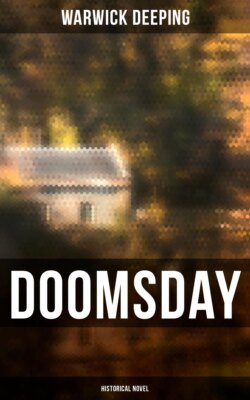Читать книгу Doomsday (Historical Novel) - Warwick Deeping - Страница 17
На сайте Литреса книга снята с продажи.
1
ОглавлениеArnold Furze struck back along the lane, and turned into the Gore Field by the gate opposite the pond. He had blown out his lantern, for in truth it had not been needed after its lighting of Mary Viner down the steps and along the path, with the moon's silver lamp rising in the sky. Furze loitered here, one arm along the bar of the gate, the old thorn trees in the hedge making a shaggy blackness, and the Gore sloping away from his feet like a mirror that has been breathed upon.
His sheep were pastured here, for he preferred to run them on the grass to folding them on a root crop, and at the end of the field and under the shelter of the Gore Wood were the pens and shelters of hurdles and faggots where the lambing ewes and their lambs were kept snug for the first few days. But for the moment Furze was not thinking of his ewes. He was thinking of Mary Viner and her big brown eyes with their smoking lashes, and her quick changes of colour, and her air of breathlessness. A creature so easily scared and silenced—so he thought. And sensitive, and not too happy. Yet, she puzzled him, and he, supposed that he did not know much about women. He had been too busy doing things. But her moods and their expressions seemed to blow this way and that like brown leaves on a March day; she appeared to be moved by vague currents that would not have been perceived by his stronger nature. She was yea and nay all in one breath, giving him the impression of a palpitating, warm-blooded bird. Her refusing to enter his house—for instance, and then her coming in, and the queer blight that had swept suddenly over her face after he had closed the door of Mrs. Damans' parlour. Certainly, he had hesitated about asking her in, for never till that moment had he realized the almost sordid poverty of his house. It had come upon him in a flash when he had seen her there with the white jug pressed to her bosom, and her brown eyes all glimmering. It had come as a shock. He had put out a hand and closed that other door because he had felt that house's nakedness and was suddenly ashamed of it.
What had she thought of his room with its rough tables and its litter and its deplorable old chair? It must have seemed to her a squalid hole. And what if the seeming squalor of it had attached itself to her impression of him? He was conscious of a gust of mortification.
She would not understand—perhaps—how he had had to labour incessantly and furiously in the service of the soil, and that he had had neither the time nor the patience nor the money to be fastidious? He had just succeeded in keeping clean. But that room, and Mary sitting on the edge of the chair as though she was not sure of it, and her air of rigid decorum, and her half-frightened eyes, and her hurry to be gone!
"Damn!" he said, and flung away from the gate and down the field. "I can't afford sentiment—at present."
For the rest of the night, under the waning moon and the shepherding stars, he was kept busy. Crouching in one of the shelters, with his lamp hung from a forked stake, he had to succour one of the ewes. It was life and death in the sheep pen, with the moon paling and the stars going over, and a little whispering wind coming with the dawn, and Furze, like the eternal shepherd, losing life and saving it. In the greyness of the dawn the poor ewe lay dead, and Furze, tired and grave eyed, went up the slope of the Gore with a new-born lamb wrapped up in his coat.
Passing through the gate he met Will Blossom coming to his day's work, and the two men looked at the little, long-legged creature.
"I'm sorry to have lost that ewe, Will."
"They will die, sir."
The blue eyed man spoke as though dying was a natural cussedness.
"You'll give he the bottle."
Furze smiled, and stroked the lamb's head.
"Bring me up an armful of hay, Will. The little fellow can lodge in my room."
So Bobbo sat and watched a little bleating thing lying on a sack on his master's bed, while Furze routed out an old hamper, and filled it with hay, and put the orphan to bed beside the fire. Bobbo was a very wise dog; he knew all about sheep and their stupidities, and the mischievous vagaries of young cattle. The lamb was as safe with him as it would have been with its own mother.
Furze looked from the lamb to the dog.
"Gentle, Bobbo. We've got to be gentle, old chap, to all such things."
The dog's amber eyes stared up at him devotedly. The night was over, but the day's work waited, and Furze went into the kitchen to wash.
